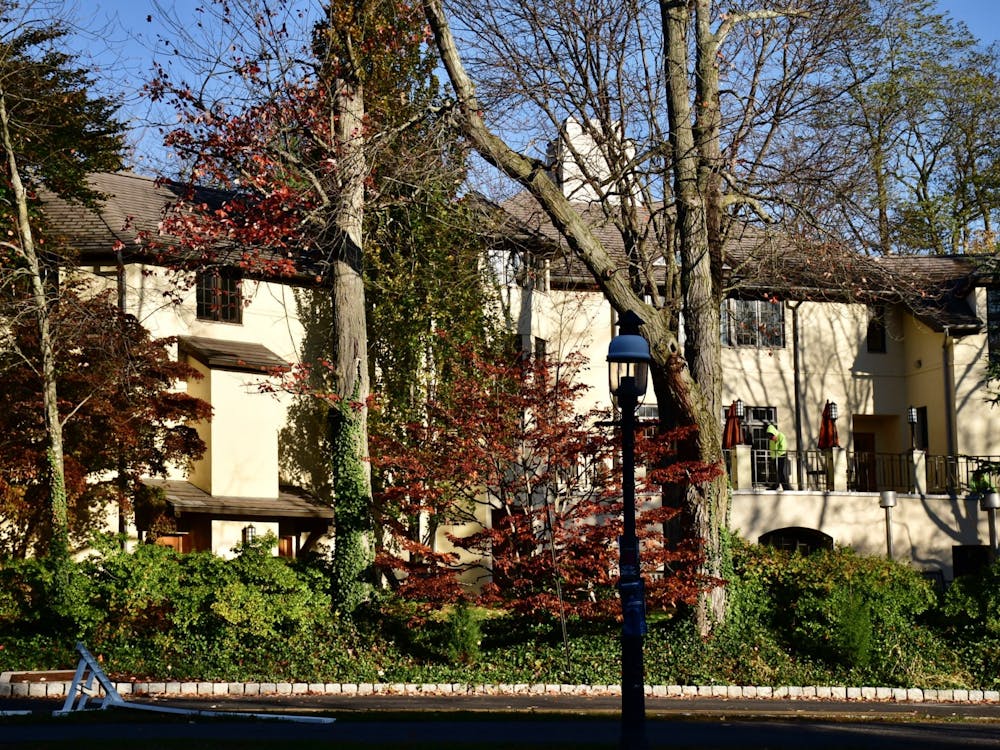“Princeton has hired a substandard company to perform DEADLY ASBESTOS ABATEMENT” and this company “cheats its workers ... Exposure to asbestos causes cancer. One fiber is all it takes.” Next there is a photo of President Tilghman, and a plea for readers to “tell her to hire only responsible contractors” — meaning, union shop? — “to perform this hazardous work.”
Finally, in small print, the flyer clarifies that “we” — whoever the “we” may be, as the bill doesn’t identify the sponsors — “are appealing only to the public. We are not seeking to induce anyone to cease work or to refuse to make deliveries.”
As I asked for still more information — “What union is this?” “LIUNA,” they answered. “What’s LIUNA?” “Laborers’ International Union of North America.” “Why no attribution on the flyer?” No answer — a man in a business suit approached. “Why don’t you get real jobs?” he shouted. “Unions are destroying America!” amid a slew of four-letter words.
Back at the office, I called Bob Durkee ’69, University vice president, and asked how many calls had President Tilghman received about the rat. “Exactly one,” he replied with a chuckle, “and that was from a local union leader to offer support.” So much for the power of the rat, this one at least, symbol of opprobrium for strike breakers everywhere, to energize public opinion.
What is the larger issue here? Durkee assured me that Princeton has “great relations with labor,” contracting with union shop firms for work “on campus” (unlike this asbestos cleanup, at off-campus housing). And we can make fun of the big rat, an easy target, full of hot air and patched with duct tape, emblematic of the sorry state of unions in 2011. The real story should not be lost on students and faculty at this great university.
Say what you will about unions and corruption — The Star-Ledger’s headline today is “Union leader charged with embezzling thousands” — you have to concede, as Robert Reich details in his books and TV appearances, when unions were powerful, embracing up to 40 percent of the labor force, the nation enjoyed full employment, income inequality was a thing of the Gilded Age past, income taxes topped 90 percent for the wealthiest and the economy hummed along, the envy of the world. In short, according to Reich, unions were — and could be again — an engine for the middle class, antidote to poverty and joblessness.
So what is Princeton doing, and more to the point, what should Princeton be doing “in the nation’s service” in this era of 16 percent unemployment, rising to 25 percent for 20-somethings, even as Wall Street bankers rake in six-and-seven-figure bonuses for “betting against bets,” as The New Yorker writer George Packer describes much of what passes for investment banking?
A quick Internet tour of the Undergraduate Announcement on such topics was somewhat disappointing. I expected to turn up more than 12 courses with the word “poverty” listed in the course description, and one of those was called “Victorian Lit.” Some of the courses suggest a solid focus on poverty, such as “Environmental Change, Poverty and Conflict.” But I had hoped to find more courses with titles like “Poverty, Unemployment and What YOU Can Do to End the Cycle of Misery,” or something equally subtle.
So never mind the risible inflatable rat, squatting outside campus doors; there may be no “shame” in Princeton’s labor relations. But, for all her greatness, Princeton may be able to do a better job of leading future leaders to learn, study and probe the causes of poverty and what public policy fixes can put the jobless back to work — with or without unions — and maybe even to help end the “blue state” vs. “red state” paralysis. And there’s plenty for student activists, mindful of Dr. Martin Luther King’s call for “economic justice,” to do. Groups such as the Princeton Justice Project can monitor the University’s hiring and contracting policies. They can revive the “living wage” movement, starting with Princeton’s lowest-paid workers. They can seek answers to such painful questions as why should 40 percent of single mothers and their children be living in poverty, enduring a “permanent economic depression,” in the words of writer-activist Barbara Ehrenreich, author of “Nickel and Dimed in America,” her account of the lives of America’s working poor.
A tall order but, hey, this is Princeton. Welcome back!
R. William Potter ’68 is an attorney in Princeton and a frequent preceptor in law-related courses at the University. He can be reached at potterrex@cs.com.








